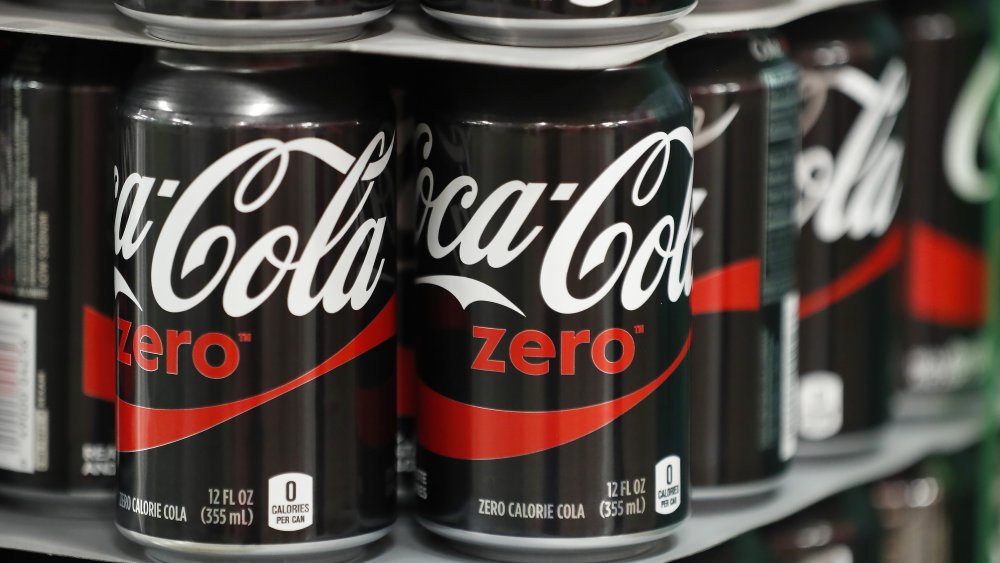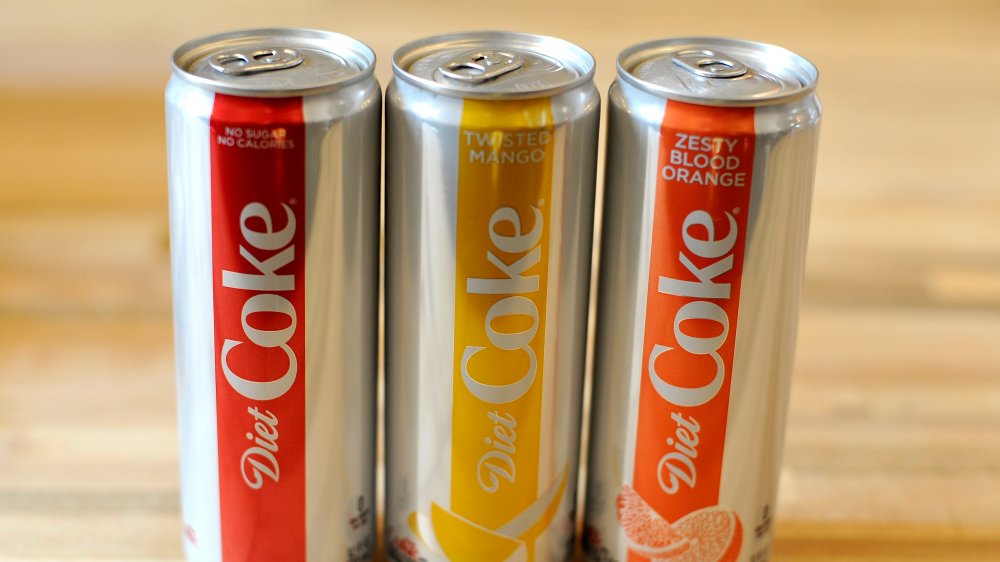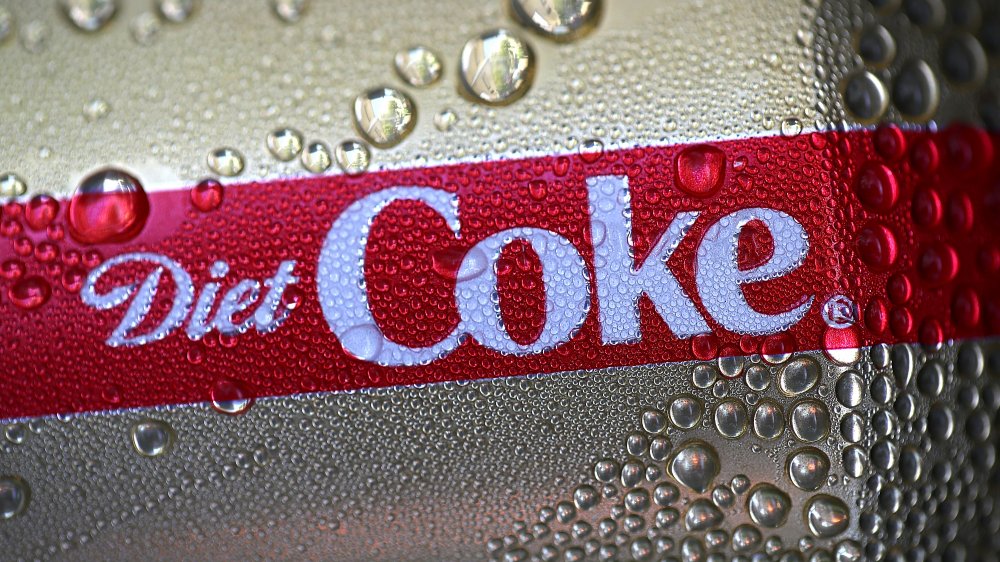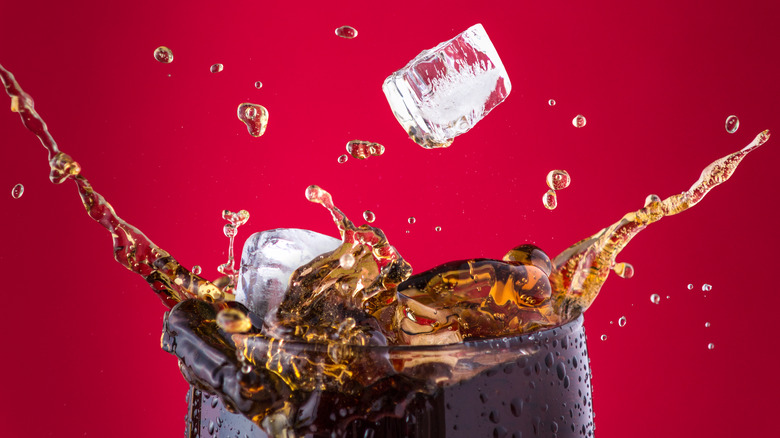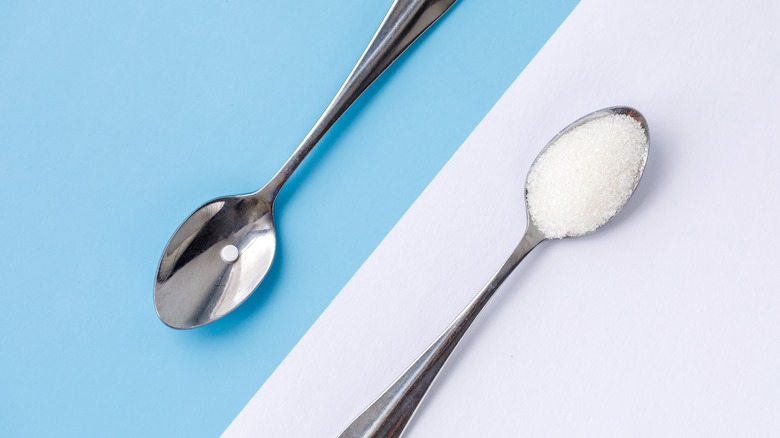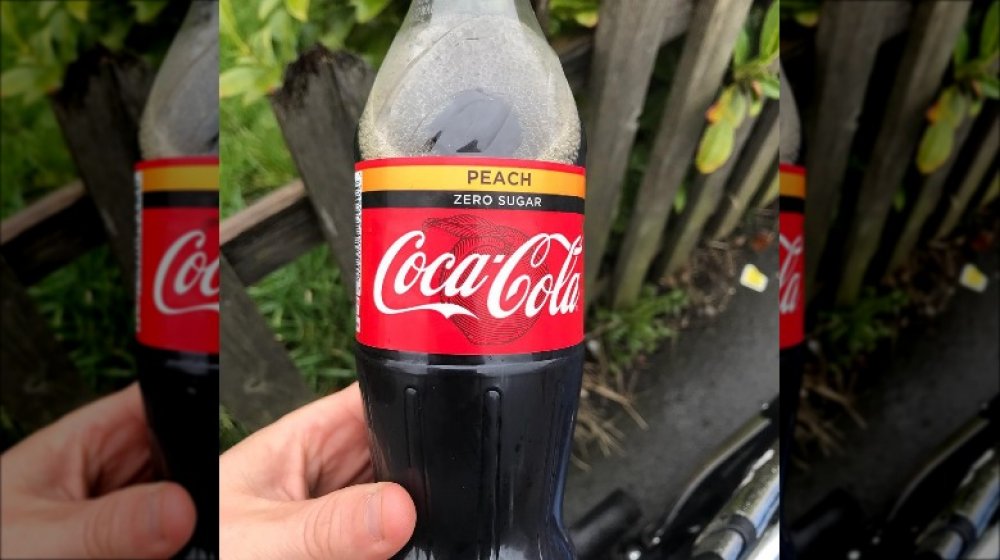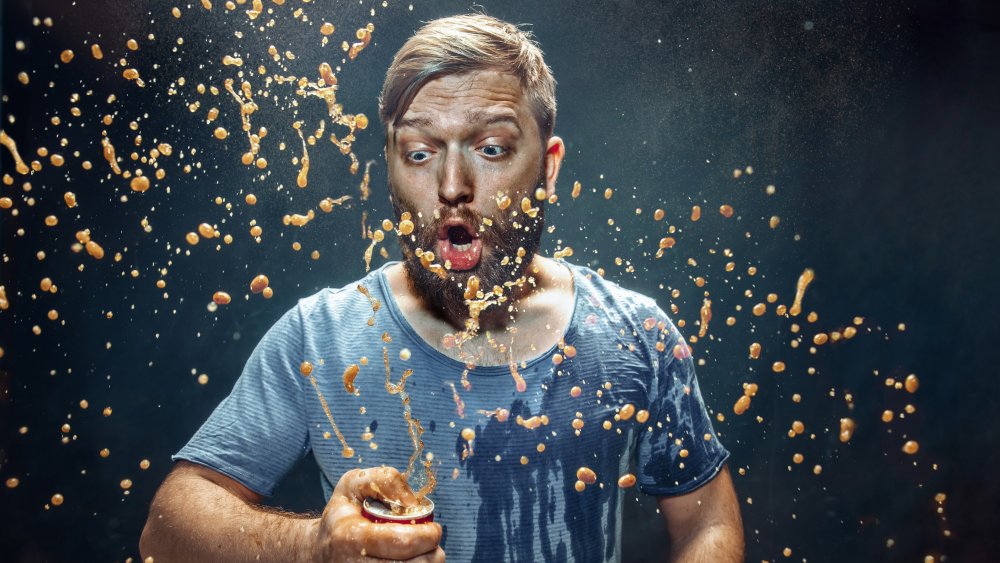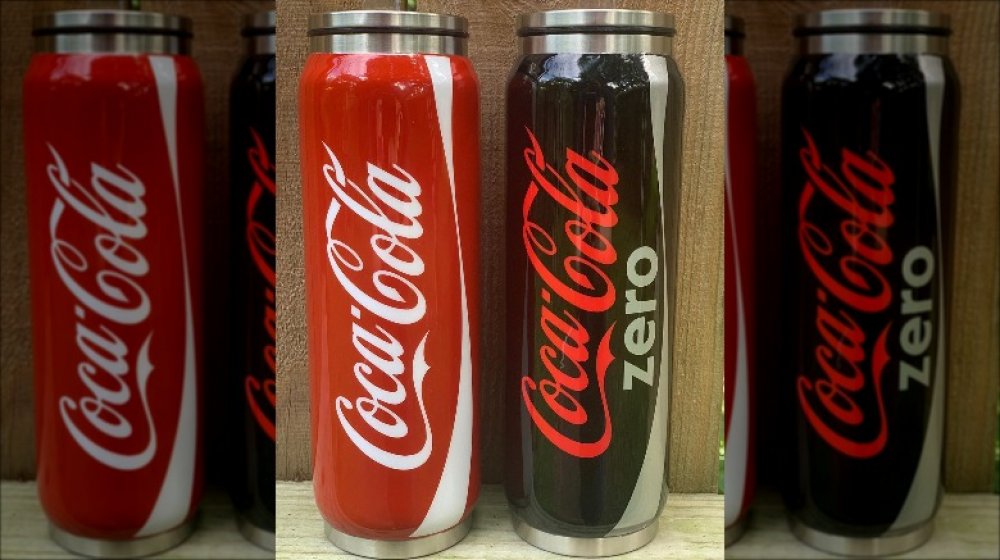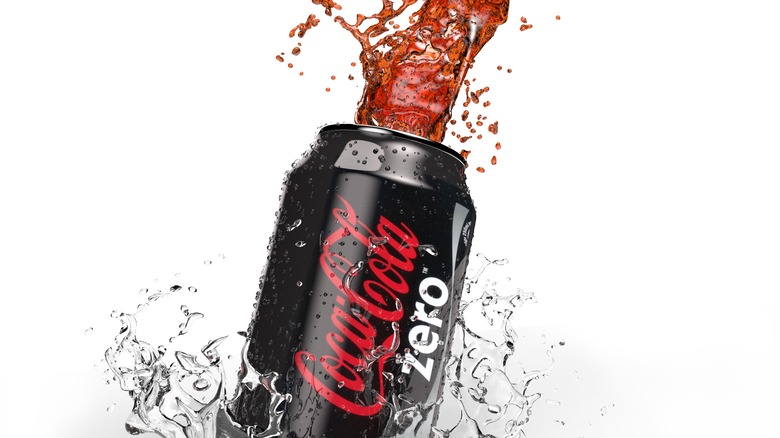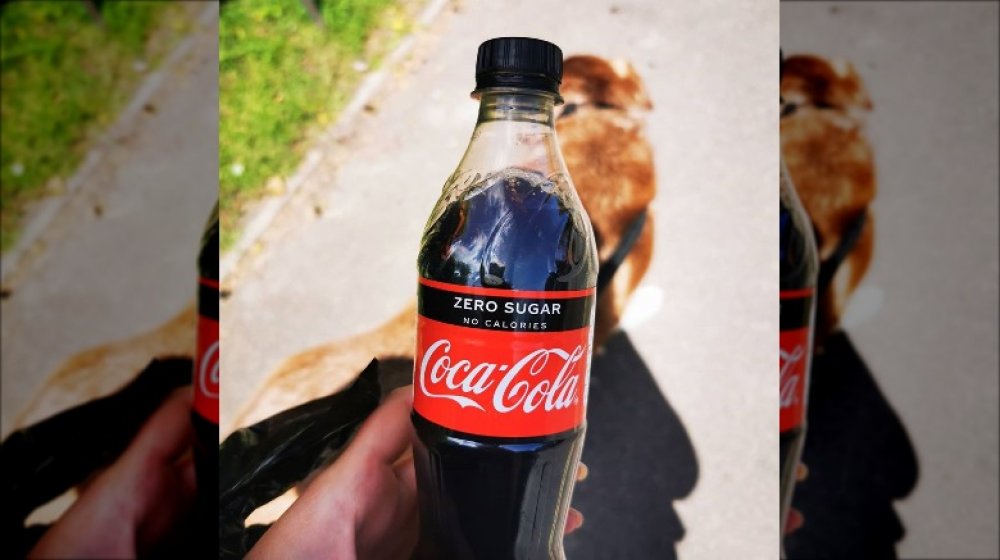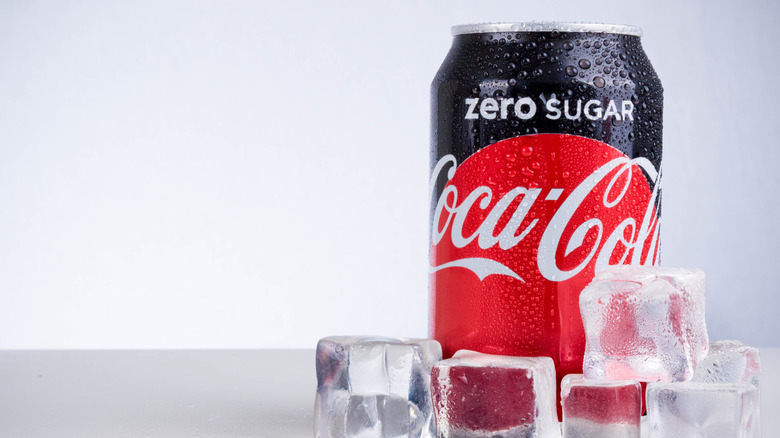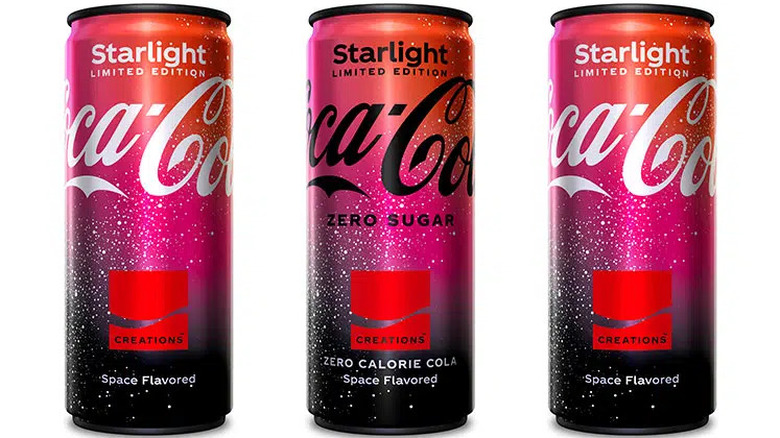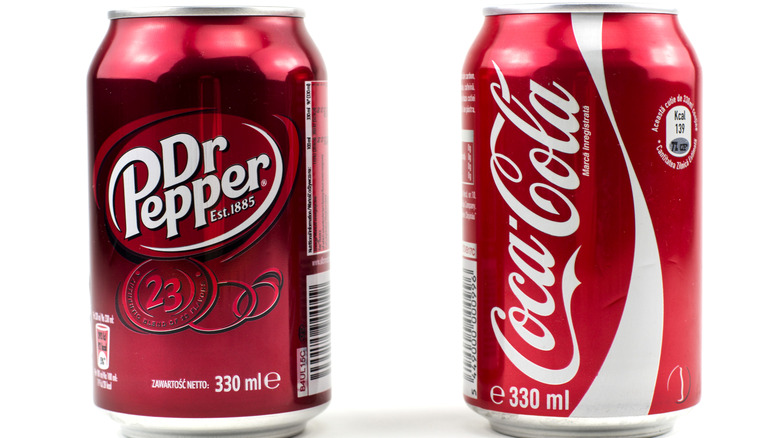The Untold Truth Of Coke Zero
After hitting the scene in 2005, Coke Zero has gone on to become one of Coca-Cola's most recognizable brands. Today, this slimline soft drink — which is now known under the "Coca-Cola Zero Sugar" brand — sits comfortably up on that cola parthenon with its not-too-divergent siblings: Diet Coke and Coca-Cola itself.
But there's a lot more to the Coke Zero story than you might expect. Things may be hunky-dory now, but over the years Coke Zero (or Coca-Cola Zero Sugar, or Coca-Cola No Sugar, or whatever you want to call it) has been subject to marketing controversies, health concerns, and tax woes that have threatened to dismantle the drink's seemingly unimpeachable reputation. And then there are the questions: Is it bad for you? How is it different from Diet Coke? And just how different does it really taste to original Coca-Cola? For all this — and more — here's the untold truth of Coke Zero.
A history of diet sodas
Coke Zero's origins can be traced back to its soft drink progenitors; the early diet sodas. The very first of these was No-Cal Ginger Ale, a sugar-free soft drink created by Russian immigrant and businessman Hyman Kirsch, who wanted to sell a drink that could be enjoyed by the diabetic patients at the Jewish Sanitarium for Chronic Disease, where Kirsch was vice president.
Soon enough, other soda companies began producing their own competitors to Kirsch's product. In 1954, Canada Dry introduced Glamor, a zero-calorie ginger ale. The Royal Cola Company released Diet Rite Cola in 1958, originally sold at drug stores to diabetics, but in 1961 the product was expanded and sold in supermarkets across Chicago.
In 1963, Coca-Cola launched TAB (the company was warned not to call it Diet Coca-Cola for fear of damaging their trademark), while Pepsi released Patio Diet Cola (named so for the same reasons as TAB). In 1964, the latter company dropped the confusing brand clash, and Patio Diet Cola became Diet Pepsi. The next few years saw the release of a bunch of diet sodas, including Sugar Free Dr. Pepper, Fresca, and Sugar Free 7-Up. These drinks were no longer made for people with health problems — they had become a national sensation.
Diet Coke was released in 1982, swiftly replacing TAB as Coca-Cola's flagship diet soda — and in 2005, the company released its next iconic low-cal soft drink: Coke Zero.
Coke Zero v. Diet Coke
You might think that Diet Coke and Coke Zero are like two peas in a pod — aside from them looking a little different — but the truth is that there are a handful of differences between these two drinks, beyond just their appearances.
The most noticeable difference of all is the taste. While Coke Zero is made to taste exactly like regular Coca-Cola, Diet Coke has its own distinct flavor — in Coca-Cola's words, "a lighter taste." In this sense, you're probably best thinking of Diet Coke as a separate product entirely, while Coke Zero is nothing more than a slimmed-down version of the original. There's also a very slight difference in the ingredients — Coke Zero contains sodium citrate, whereas Diet Coke contains citric acifd. The latter is, according to Coca-Cola, the "most widely used organic acid in the food industry," and is used in beverages to provide tartness. Sodium citrate does the exact same thing, and neither appears to be much better or worse than the other.
Most notable of all, however, is the effect that Coke Zero is having on Diet Coke's sales. As the new kid on the block has become more popular, Diet Coke's sales have suffered — with executives at Coca-Cola saying that Coke Zero is "cannibalizing" sales of Diet Coke (and even original Coca-Cola) in certain markets. This is because Diet Coke isn't appealing to the company's more health-conscious customers, who are increasingly flocking to Coke Zero as the better low-calorie alternative.
We don't know secret recipe for Coke Zero
If you look at your can of Coke Zero Sugar, these are the ingredients you'll find listed: carbonated water, caramel color, phosphoric acid, aspartame, potassium benzoate, natural flavors, potassium citrate, acesulfame potassium, and caffeine. Of course, Coke Zero Caffeine-Free doesn't contain any caffeine. However, the other flavors (which are Cherry, Cherry Vanilla, and Vanilla) do (via Coca-Cola).
It's not clear what exactly is meant by "natural flavors," but you're not alone: this is a mystery to most people. Indeed, we may never know the exact combination of ingredients used in Coke Zero Sugar's natural flavors. However, according to the USDA Food Safety and Inspection Service, ingredients that can be referred to as "natural flavors” include spices, spice extracts, essential oils, oleoresins, and specific vegetable powders and juices.
Even then, the exact nature of Coke Zero's ingredients is murky. Secrecy has always been a particularly powerful strategy for companies across industries, so much so that, when asked to reveal exactly what their formula is, Coca-Cola has been known to leave countries altogether rather than spill the secret, as the New York Times reports. And so, the Coke Zero Sugar recipe remains, like all other products of the company, shrouded in mystery.
There may be health concerns for Coke Zero Sugar
For a drink that basically has no nutritional information, one would expect no health concerns. However, this is not necessarily the case. Coke Zero Sugar products come with a disclaimer most people probably miss unless it affects them directly: "PHENYLKETONURICS: CONTAINS PHENYLALANINE." According to the FDA, this is a warning for people who have a genetic disorder called phenylketonuria, which causes the body to be unable to process the phenylalanine amino acid. For phenylketonurics, who must adhere to a strict diet, too much phenylalanine in their system can cause serious brain damage.
You don't need to have a genetic disorder to be mindful of your consumption of Coke Zero Sugar, though. Cola, in particular, may be linked to low bone mineral density in older women, as per a study from the American Journal of Clinical Nutrition.
According to Healthline, the use of artificial sweeteners in soft drinks has been linked to an increased risk of a range of health problems, including heart and kidney disease, osteoporosis, adverse changes in the gut microbiome, and long-term weight gain. Still, it remains important to remember that the absence of obvious health risks does not mean Coke Zero is immediately good for you.
All the colas of the Coke Zero rainbow
Of course, the Coke Zero diehards (we know you're out there) will be able to tell you that Coke Zero isn't the only "Zero Sugar" drink offered by Coca-Cola. In fact, there are several variations on the classic recipe.
Caffeine Free Coke Zero is basically what it says on the can — same ingredients, same taste, less chance of it getting you all jittery. There are a handful of specific flavors too, including Cherry Vanilla, Vanilla, and Orange Vanilla. Slightly more obscure is the Coca-Cola Energy Zero Sugar, which is kind of like a Coke Zero energy drink — it contains 111 milligrams of caffeine per can, more than three times the amount as a normal can of Coke Zero, as well as a number of vitamins, including B3 and B6. Then, if you want to get really specific, you've got the cherry-flavored version of this, Coca-Cola Energy Cherry Zero Sugar. This contains a little more caffeine as well as that cherry flavor.
Even more variants can be found in overseas markets. For example, certain countries, including Australia, have seen the release of Coca-Cola Peach No Sugar, which the company called "a great addition to pool parties, BBQs, and beach days." The company released a special festival version of Coke Zero, made with cinnamon, in 2018. That same year, Coca-Cola Stevia No Sugar was released in New Zealand — with Coca-Cola pointing out that stevia is "200 times sweeter than table sugar".
Coke Zero was marketed as a men's soda
When Coke Zero first debuted in 2005, the product's marketing was angled towards one very specific group of people: men. And this hasn't really changed over the years, either. In 2013, Coca-Cola ran a series of ads suggesting Coke Zero was the birthright of "guys being guys." When the company began introducing that neat little gimmick where you could get names printed on cans, the advertising for the generic words used on Diet Coke and Coke Zero cans couldn't have been more different: Diet Coke featured epithets such as "BFF," "Star," and "Go-Getter," whereas Coke Zero cans were emblazoned with the words "Grillmaster," "Wingman," "Gamer," and "Bros."
There's a reason for this too: Apparently, men won't drink Diet Coke. In the past, Coke has tried to convince men to buy and drink Diet Coke, with lackluster results. Arguably, this comes down to the perception that diet products are inherently feminine — and apparently Diet Coke's white can doesn't exactly help, either.
But Coke Zero, with its black can and male-oriented marketing strategy, has been far more successful. According to Harvard Business School lecturer Jill J. Avery, what Coke quickly realized "was that even though there was a functional need for men to drink lower-calorie soda, men couldn't bridge the gender gap image-wise without a new brand and product just for them. It was a way to tell men, it's OK, here's your brand. Drinking this brand won't affiliate you with women."
Coke Zero's zero movement was a misfire
While Coke Zero has been a major success story for Coca-Cola, the soda's launch in Australia back in 2006 was something of a disaster. The company attempted to tease the release of Coke Zero with a viral marketing campaign. They created something called the "zero movement," which appeared across Australia on posters, coasters, chalk graffiti, and a now-defunct website.
On this website, you could read the zero movement's manifesto, which doesn't so much bring to mind an edgy street vibe as it does an international terror cell. You could also download the movement's branding material, and read blog posts that asked: "Why can't every weekend be long?" and "Why can't I still get toys for Christmas?" Basically, Coca-Cola were trying to appeal to tech-savvy internet-loving twenty-somethings.
But the tech-savvy internet-loving twenty-somethings were not impressed. Blogs across Australia voiced their distaste for the campaign, with one parody site suggesting visitors spend money on charity rather than sodas, and another selling T-shirts reading: "I joined the zero movement and all I got was this lousy brain tumour."
According to marketing lecturer Gary Buttriss, companies as large as Coca-Cola are always taking a risk by attempting viral marketing campaigns. "I think businesses are attracted to it because they think of it as a new and inexpensive channel to the market," he said at the time. "But it is still in its infancy and the big brands are most at risk from the possible negative consequences."
Coke Zero has had other marketing mishaps
Australia wasn't the last of Coke Zero's marketing woes, however. When the product was released in the UK, Coca-Cola attracted flak for its Coke Zero launch campaign. It featured a number of ads with various straplines, playing on the idea that Coke Zero contains the best part of Coca-Cola without the worst prat. Many of these straplines were criticized for being offensive to various groups. "Girlfriends without a five-year plan," for example, sparked complaints for implying that all women want to do is settle down. (And there's that male-oriented marketing, again.) "Gigs without tall people" was criticized for marginalizing tall people and encouraging verbal and physical abuse. Most of all, however, "Blind dates without the psychos" attracted criticism from mental health charities, such as the Scottish anti-stigma campaign See Me.
In a statement on behalf of Coca-Cola, a spokesperson said: "Mental health is a sensitive issue and we appreciate that this ad may offend some people."
Some fans weren't happy with Coke Zero's rebranding
Many people get excited when their favorite brands make changes to products they adore. But there's also a sense of familiarity that ensures loyalty to specific products that perhaps comes to the fore once changes are implemented and you're able to compare. According to Business Insider, when Coke Zero initially rebranded to Coke Zero Sugar in 2017, fans were not impressed. "Coke Zero doesn't need a new recipe... It's ten times better than Diet, and everyone knows this. If anything, replace Diet Coke's recipe," wrote a Facebook user, while one Twitter user lamented: "There is no God."
At the time, Coca-Cola asserted that Coke Zero Sugar was geared to taste like original Coke. CEO James Quincey said that, although it represented a risk to rebrand, consumers would "get it immediately" (via Business Insider).
However, when the Coke Zero Sugar was given a refresh, uncertainty arose all over again. Per Refinery29, not only did the new rebrand trigger memories of the New Coke marketing disaster of 1985, but Twitter users responded to Coca-Cola's announcement with trepidation. One user even insisted that "The new recipe is shocking. I won't be buying another can until you fix your mistake and bring back the old flavor" (via Daily Mail).
Coke Zero in the U.K. looks a little different
In the U.K. the New Coke redesign went one step further. There, Coca-Cola decided to redesign the packaging for the new Coca-Cola Zero Sugar to look more or less exactly like the packaging for classic Coca-Cola.
The red and white color scheme remained, with just a small, black strip across the top of the bottle or can to let customers know it was the zero sugar version. This came as part of a concerted attempt on behalf of Coca-Cola to sell more no-sugar drinks in the UK (at the time, in 2018, 58 percent of Coca-Cola sodas sold in the country were no-sugar versions.)
In a statement, the company said: "The changes unify both variants with the iconic Coca-Cola red and form part of the company's commercial strategy to encourage more people to try Coca-Cola Zero Sugar."
But there's a slightly more predictable reason that may have been behind this particular rebrand. In April 2018, the U.K. government had introduced a sugar tax and drinks containing more than eight grams of sugar per 100 milliliters of liquid taxed at the equivalent of 31 cents per liter. Unlike other companies, Coca-Cola did not change their recipe to adapt — and this push for consumers to buy no-sugar alternatives seems to have been their way to skirt the sugar tax and make a little more money. No surprise there, huh?
It was rebranded from Coke Zero to Coke Zero Sugar
It's not unusual for major companies to initiate product rebrands every once in a while. Often, these rebrands are strategic reflections of the contexts in which they are located. In July 2016 — a month after chancellor George Osbourne announced the possibility of a sugar tax on soft drinks was under consultation — the UK led the Coca-Cola Zero Sugar launch (via Business Insider). The US soon followed when the rebranded version became available stateside in August 2017, according to Coca-Cola.
While the initial rebrand was set to maintain the look and taste of Coke that consumers know and love with no sugar or calories involved, a more recent "refreshed" version was released in 2021. This updated version not only promised to "optimize existing Coca-Cola Zero Sugar flavors and existing ingredients," but it came with sleek new packaging reminiscent of the original Coca-Cola and "Now More Delicious" messaging.
The new Coca-Cola Creations Hub features limited edition flavors
If you've ever wondered what space and pixels might taste like, you now need only your curiosity to find out, thanks to Coca-Cola's Creations. In February 2022, the company launched the first of its Creations series: Starlight Limited Edition. The new drink was said to be "space flavored." Consumers attempted to describe the flavor using language that's a little more earth-centric. One YouTuber said it tasted like chocolate and graham crackers, while some Reddit users have noticed notes of s'mores and Cinnamon Toast Crunch.
The latest installment, Byte Limited Edition, was released from April through May 2022. Both the space and gaming-inspired soft drinks have a Zero Sugar version. Meanwhile, the packaging showcase the flavors with bright, star-studded, and pixelated details.
The Coca-Cola Creations Hub includes clothing collaborations with PacSun, Staple, and Spirit Jersey; digital collectibles and Instagram filters; a Zero Sugar Byte island featuring games and emojis; and even a performance by Ava Max that you can launch with your can or bottle of Starlight. It all sounds out of this world, but that's the point — to venture out and explore for yourself.
Celebrity partnerships have fueled new Coke Zero
We all know that celebrity endorsements can have a significant influence on a brand. According to Forbes, companies such as iWalk2.0 and Jane Taylor London have enjoyed wider exposure and increased sales due to associations with influential public figures. This may in large part be a result of the celebrity effect, which Chron. says can lend credibility and glamor to brands while seriously boosting interest and sales.
When Coke Zero Sugar launched in 2016, the campaign was headlined by British singer-songwriter Rita Ora, according to Business Insider. And in March 2022, Coca-Cola revealed its partnership with Indian actor Kriti Sanon to launch the #BestCokeEver? marketing campaign in India (via Business Insider India).
This follows the brand's 2021 launch of other celebrity campaigns in the UK and Asia. The "Open That Coca-Cola" campaign, which set out to be elevated by the "evolved Coca-Cola Zero Sugar" and for which rapper Tyler, the Creator made an exclusive new song.
One celebrity Coke Zero partnership seriously fizzled
As much as celebrity partnerships might seem like a no-brainer if you have the resources to secure them, Chron. does warn that there are risks involved in such big-name ventures. When the entirety of a brand's marketing plan hinges on a celebrity partnership and then said celebrity does some less-than-savory things, the whole company could suffer.
In 2010, reports Metro, Coca-Cola refused to plaster soccer player Wayne Rooney's face on Coke cans and bottles. Allegations had come out that Rooney had taken part in extramarital affairs while his wife was pregnant. This followed multiple previous scandals, including Rooney's rage incidents as displayed on the soccer field, antagonistic behavior towards fans, and those persistent infidelity allegations (via Bleacher Report).
Coca-Cola eventually announced that the partnership was canceled altogether (via The Telegraph). Sometimes it's better for a company to simply cut its losses, regardless of how influential a partnership could have been, at least when the celebrity in question just can't keep their act together.
Coca-Cola and Dr Pepper have a bitter rivalry over the Zero
If you think of Coca-Cola and PepsiCo, McDonald's and Burger King, Starbucks and Dunkin' Donuts, and you've got some of the biggest, longest-running rivalries in the food and beverage industry. In fact, according to Entrepreneur, businesses absolutely need competition to thrive and stay relevant. Stressful as it may seem, competition develops a brand's identity and forces its workers to self-reflect and stay on their toes. Sometimes, some gentle joking through social media may even help both brands gain further recognition.
However, the rivalry between Coca-Cola and Dr Pepper is not so much about playful jabs through ad campaigns or menu changes. The two companies were locked in a legal battle wherein Dr Pepper argued that Coca-Cola should have a disclaimer indicating that it doesn't own the word "Zero." At least, they shouldn't when the word is used in conjunction with the company's products, went the claim. A US court revived the case in 2018 after it had been initially dismissed in 2016, according to Reuters. However, the 13-year battle was finally concluded in 2020, reports Law Street, when a judge found in Coke's favor and dismissed the suit.
